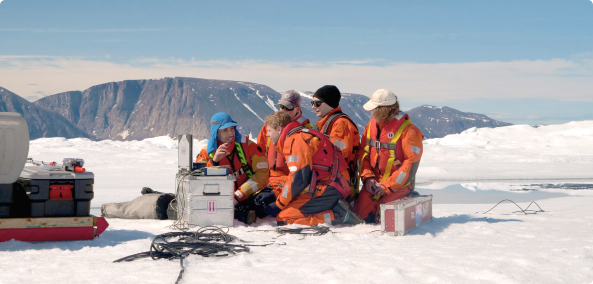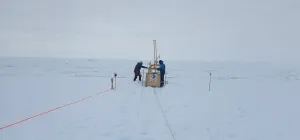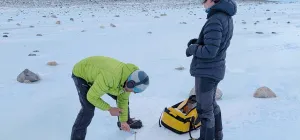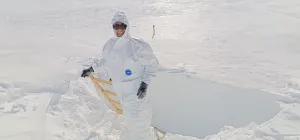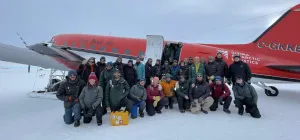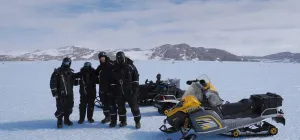A drill stuck in the ice

The scientists at the coast have been extracting ice and firn cores from various sites across the King Baudouin Ice Shelf. The shallow firn core drillings Jan Lenearts has been taking for the BENEMELT project have been very successful. However, as the ULB IceCon team tried to drill deeper into the ice shelf to extract a deep 150-metre ice core, the drill head got stuck...
What's the drill?
In order to drill a deep ice core, one must take a stepwise approach. Every 1.5 metres you drill, the drill head must be pulled back to the surface to recover the ice core. The drill head must also be cleaned, and drilling debris removed.
However despite following all the rules one needs to follow for ice core drilling, the drill managed to get stuck in the ice after only 50 metres while they were drilling the last 150-metre ice core. While everyone tried several ideas, the stubborn drill head refused to get out of the ice!
Since the drill head is attached to a metallic cable, the team tried to use the cable to gently move the head around to loosen it up. The problem is that that cable is quite thin, and might easily snap with the cold. If that happened, a simple inconvenience could turn into a real catastrophe for the scientists.
The cavalry to the rescue
Using the InmarSat telephone, the scientists contacted the station and spoke to Kristof, our veteran mechanic of several seasons. After taking the call, he sprang into action. Kritof loaded a Prinoth tractor with some extra fuel, spare parts and a bit of anti-freeze on the request of a scientist, and set off towards the coast.
In order to save time, another Prinoth left from the ice shelf to meet with Kristof halfway to pick up the supplies to bring back to the the scientists. Just 24 hours after the call for help was made, the scientists managed to free the drill head and get back to work. Thank goodness for Kristof!
Tick tock
After freeing the drill head, the scientists decided to try another drilling location. Taking advantage of the 24-hour sunlight this time of year in Antarctica, the scientists have been working in shifts to finish drilling the ice core. They’ve already made significant progress, managing reach a depth of 80 metres.
What remains uncertain is whether they’ll be able to make it through to the bottom of the ice shelf as originally planned. Time is running out. Regardless of whatever progress they can make, the whole camp on the ice shelf must pack up and leave in two days so they can be back at the station on the morning of Thursday December 18th. This will give all the scientists about a day to get ready to go home for the season. Their flight back to Cape Town leaves on Friday December 19th. They can’t miss this flight if they want to be back in Belgium in time for Christmas!
Some fly in, some fly out
Before they leave, the scientists who have been at the station since the beginning of the season will get a chance to meet some new arrivals this season: German scientists form the Alfred Wegener Institute (AWI), who will conduct aerial geomagnetic surveys with their Polar 6 aircraft over the next month or so.
The Germans will arrive tomorrow - a bit earlier than expected. But the station can handle the surge in inhabitants for a day or two. Extra company is always welcome in this remote part of the world.
Download